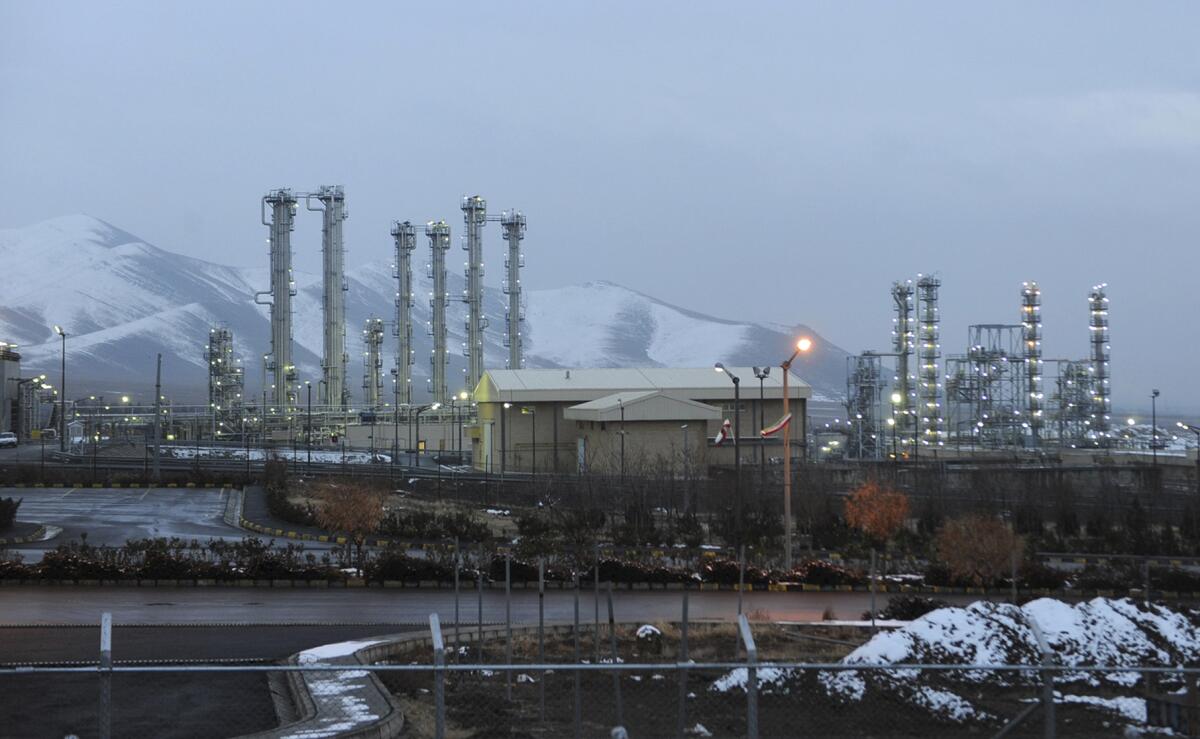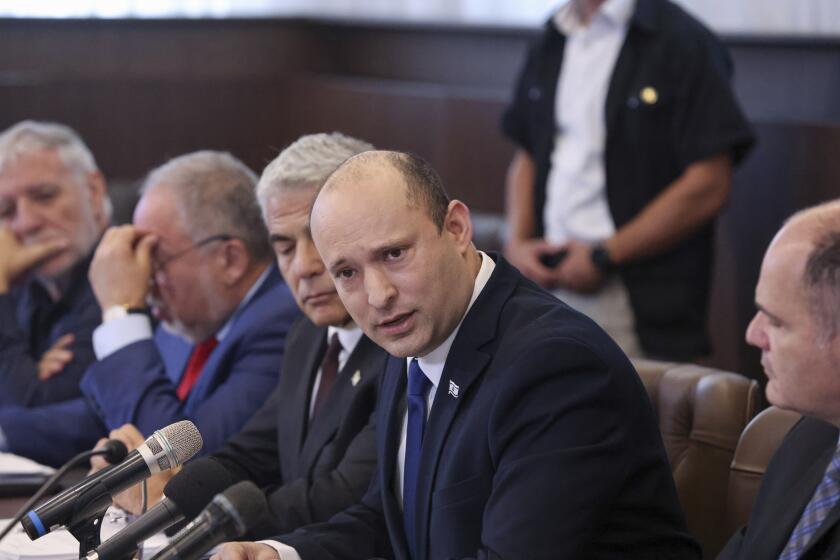Iran nuclear talks bring nations ‘closer to a deal,’ top diplomats say

- Share via
VIENNA — Top diplomats said Sunday that further progress had been made at talks between Iran and global powers to try to restore a landmark 2015 agreement to contain Iranian nuclear development that was abandoned by the Trump administration. They said it was now up to the governments involved in the negotiations to make political decisions.
It was the first official meeting since Iran’s hard-line judiciary chief won a landslide victory in the country’s presidential election last week.
Some diplomats expressed concern that Iran’s election of Ebrahim Raisi could complicate a return to the nuclear agreement.
Enrique Mora, the European Union official who chaired the final meeting of the sixth round of talks among Russia, China, Germany, France, Britain and Iran, told reporters that “we are closer to a deal, but we are not still there.”
“We have made progress on a number of technical issues,” Mora added. ”We have now more clarity on technical documents — all of them quite complex — and that clarity allows us to have also a great idea of what the political problems are.”
He did not elaborate.
Israeli Prime Minister Naftali Bennett opened his first Cabinet meeting with a condemnation of Iran’s new president.
Top Russian representative Mikhail Ulyanov said the members of the Joint Comprehensive Plan of Action “took stock of the significant progress made at the Vienna talks, including at the sixth round, and decided to make a break to allow participants to consult with their capitals in preparation for what is supposed to be the final round of negotiations.”
“There are a few controversial points which require political decisions,” Ulyanov added. “Apparently diplomatic efforts to find common language have been almost fully exhausted. So the time has come for political decisions.”
The nations involved in the negotiations have been trying to resolve the major outstanding issues on how to return the U.S. into the landmark agreement, which then-President Trump pulled Washington out of unilaterally in 2018. Trump also restored and augmented sanctions to try to force Iran into renegotiating the pact with more concessions.
Ulyanov said he expected the diplomats to return for the final round of talks in Vienna in about 10 days and said they could finalize negotiations by mid-July.
In a statement after the talks Sunday, the E3 European senior diplomats urged for speedy decision-making.
“Delegations will now travel to capitals in order to consult with their leadership,” the diplomats wrote without giving their names, as is customary. “We urge all sides to return to Vienna and be ready to conclude a deal. The time for decision is fast approaching.”
Iran’s deputy foreign minister for political affairs, Seyyed Abbas Araghchi, said Sunday before the meeting that “we are now in a situation that we think almost all the agreement documents are ready,” according to semiofficial Iranian news agency Mehr.
“Of the main issues that remain disputed, some have been resolved and some remain, but it has taken on a very precise form and it is quite clear what the dimensions of these disputes are,” Araghchi said.
The U.S. does not have a representative at the table in Vienna. However, President Biden’s administration has signaled willingness to rejoin the deal under terms that would broadly see the United States scale back sanctions and Iran return to its 2015 nuclear commitments. A U.S. delegation in Vienna is taking part in indirect talks with Iran, with diplomats from the other world powers acting as go-betweens.
Sunday’s meeting was overshadowed by the election of Raisi in Iran, putting hard-liners firmly in control of the government at a time when Tehran is enriching uranium at its highest levels ever, though still short of weapons-grade levels. Tensions remain high with Iran and both the U.S. and Israel, which is believed to have carried out a series of attacks targeting Iranian nuclear sites as well as assassinating the scientist who created its military atomic program decades earlier.
Raisi is the first Iranian president sanctioned by the U.S. government even before entering office, over his involvement in the 1988 mass executions, as well as his time as the head of Iran’s internationally criticized judiciary — one of the world’s top executioners.
In Jerusalem, new Israeli Prime Minister Naftali Bennett warned Sunday that Raisi’s election was “the last chance for the world powers to wake up before returning to the nuclear agreement and to understand who they’re doing business with.”
“These guys are murderers, mass murderers. A regime of brutal hangmen must never be allowed to have weapons of mass destruction that will enable it to not kill thousands, but millions,” he said.
Israel has long stated that it opposes archenemy Iran’s nuclear program and said it would prevent Tehran from obtaining nuclear weapons. Iran insists its nuclear program is intended for peaceful purposes.
Iran state TV reported Sunday that the nation’s sole nuclear power plant has undergone an unexplained temporary emergency shutdown.
An official from state electric company Tavanir, Gholamali Rakhshanimehr, said on a talk show that the Bushehr plant shutdown began Saturday and would last three to four days.
Without elaborating, he said that power outages could result. This is the first time Iran has reported an emergency shutdown of the plant, located in the southern port city of Bushehr. It went online in 2011 with help from Russia. Iran is required to send spent fuel rods from the reactor back to Russia as a nuclear nonproliferation measure.
The European Union’s foreign policy chief, Josep Borrell, said Sunday that he hoped the election of the new Iranian president would not be an obstacle to reaching a deal in Vienna.
“We are very close. We have been working for two months,” Borrell told reporters during a visit in the Lebanese capital of Beirut. “We have invested a lot of political capital on that. So I hope that the results of the elections is not going to be the last obstacle that will ruin the negotiation process.”
Grieshaber reported from Berlin. Amir Vahdat contributed reporting from Tehran; Ilan Ben Zion from Jerusalem; and Sarah El Deeb from Beirut.
More to Read
Sign up for Essential California
The most important California stories and recommendations in your inbox every morning.
You may occasionally receive promotional content from the Los Angeles Times.













